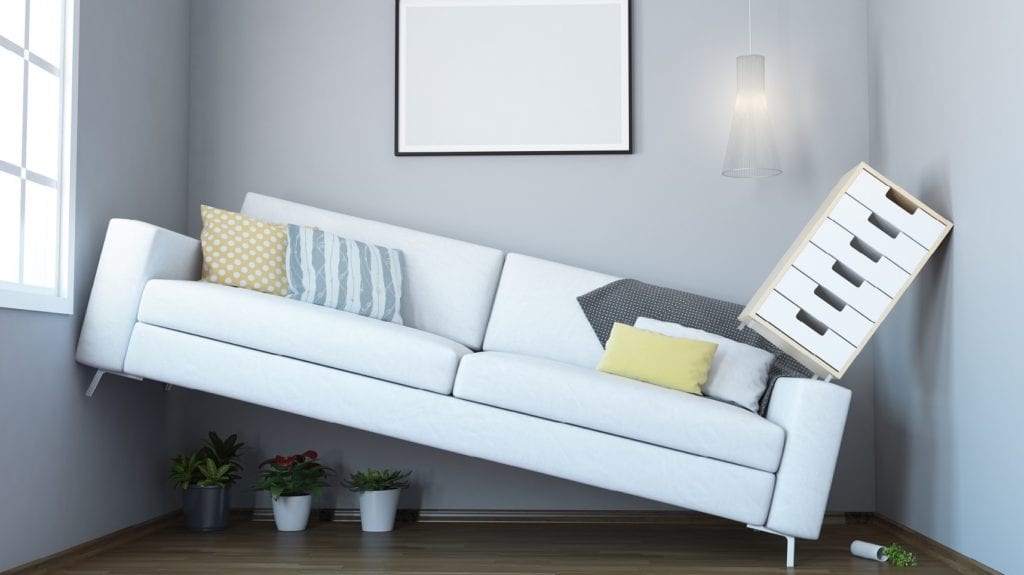
Photo: GettyImages/Eoneren
Whether you’ve got a baby on the way or you’re tired of the incessant bustle of city life, you’ve finally answered that question that’s been buzzing around in the back of your mind — it’s time to move.
But there’s another big question zooming in to replace the other one: Is it time to downsize, or is it time to upsize?
Deciding to Downsize
Why might you choose to downsize in your next home?
According to professional organizer Regina Leeds, the author of numerous books including the national bestseller One Year to an Organized Life and Rightsize…Right Now!, possible reasons for downsizing could be that your children have left home and there’s no need for all that space anymore; you may want to reduce your carbon footprint from heating and cooling a larger home; or you want to save money as you go off to college or, on the opposite end of the spectrum, gear up for retirement.
“Some people downsize to extract money from the home to use towards their retirement,” says Rita Manzione, a licensed real estate salesperson with Keller Williams Realty in Middletown, N.Y. “I’ve seen people downsize and move to be close to where their grown children are, and others move from the Northeast to a smaller house or condo in the South because they no longer want to deal with the winter weather.”
Opting to Upsize
Downsizing may have a lot to do with saving money or space, but what if you’re doing pretty well at your place of employment or you’re ready to focus on your family? It may be time for you to move on up.
“The most common reason for a homebuyer to upgrade their home is because their family is expanding,” Manzione says. “Many first-time homebuyers buy a home that is affordable and suitable for a small family. Usually about five to 10 years down the line people are more secure in their careers, their finances are more stable, and their family is outgrowing the home.”
Leeds added that other reasons you may need more space could be that you want your own office area if you’re a stay-at-home worker, have restrictions due to medical issues like wheelchairs or live-in nurses, or simply because you have the money and gusto to do so.
“A successful couple may matriculate into a world where possessions and size of home are outward manifestations of success,” Leeds says. And for most, there’s no shame in that!
Keep it Simple, Stay the Same
If neither of these options sound like your cup of tea, maybe looking for a home similar to the one you’re in now could be the way to go.
“If it ain’t broke, don’t fix it,” Leeds says. “If your home is the perfect size for your tribe, just be sure it’s well organized and don’t worry about up- or downsizing.” If that’s the case, you could always find another similar-sized home in the area you’re moving to.
This option also leaves more room for some internal work.
“If someone is buying a new home in the same area that they currently live in but are not looking to upgrade or downgrade in terms of size, it often means they are looking to upgrade in terms of house style or amenities,” Manzione says.
So go ahead, splurge on that pool, get that high-definition smart TV you’ve had your eyes on, or go for those granite countertops.
Making the Choice
If you are still on the fence about whether you should downsize or not, Leeds suggests you take some time and ask yourself these questions:
- Do you have a lot of clutter?
- Is it because you have too much or you don’t have the space to accommodate what you need or want?
- Is your family size on the way up or down?
- Are you stretched financially?
- Has your part of town changed in terms of safety?
If you can answer the majority of those questions, it should help make that choice a little easier.
“Moving is often triggered by a life event such as changes in family size or career,” Manzione says. “Each homebuyer has a unique story and situation that leads to them finding a new home, so it is important to weigh both options and make the right decision for you.”
You Made the Choice … Now What?
OK, so you’re thinking you may know which decision is the right one for you, but hold up! You’re not done quite yet. An up- or downsized life is going to have its ups and downs. You’re going to want to prepare yourself.
When upsizing your home, Manzione says, “It is important to not only consider your mortgage, tax and insurance payments when making a budget, but also the monthly expenses that come along with owning a home, such as utilities, water, garbage removal, lawn maintenance, HOA fees, cable and Internet. When a person upsizes their home, these costs also increase, so it is important to adjust your budget accordingly so you can make sure that you can comfortably afford to upsize.”
If you’re opting to downsize, on the other hand, she suggests choosing a home that offers you more convenience than your previous home. Maybe a community with a pool, gym or park in it or nearby so that you don’t feel constrained by a smaller floorplan.
“It takes time to adjust to a change even if we choose it, embrace it and know it’s right,” Leeds says. “And remember: You haven’t ‘lost’ space and stuff, you have chosen to have less in order to save money, spend less time cleaning, be free to travel, etc. You ‘lose’ in one arena and gain in many others.”

Drew Knight is a former writer and editor for HomLuv.com’s parent company, Builders Digital Experience (BDX).

 Dive Into a New Swimming Pool With Your New Home
Dive Into a New Swimming Pool With Your New Home